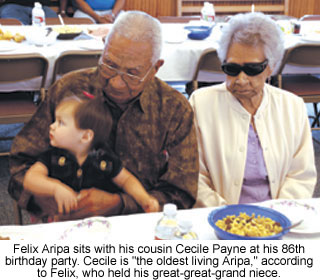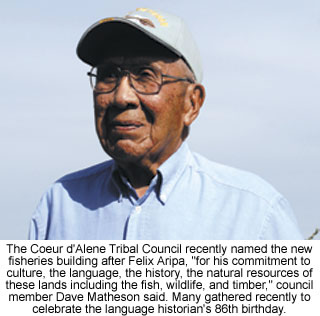 |
Canku Ota
|
 |
|
(Many Paths)
|
||
|
An Online Newsletter
Celebrating Native America
|
||
|
November 1, 2009 - Volume
7 Number 11
|
||
|
|
||
|
Felix Aripa
Coeur d'Alene Elder, Language Historian |
||
|
by Jack McNeel - Indian
Country Today correspondent
|
||
|
credits: photos by Jack
McNeel
|
|
Tribal council members and friends took turns at the microphone recognizing Aripa and his value to the community. The council decided to name the new fisheries building, the Felix Aripa Building, "for his commitment to culture, the language, the history, the natural resources of these lands including the fish, wildlife, and timber," council member Dave Matheson said. Aripa
spoke about growing up on a farm. His dad was one of the first to
attend the boarding school at Desmet, Idaho, and learned to read
and write English along with his native Coeur d'Alene language.
His mother understood the Coeur d'Alene language, but only spoke
her native Spokane language. It was from this background and visiting
the elders of his day with his father, that he learned the true
snchitsu'umshtsn (Coeur d'Alene) language and that makes him so
important to the language program of the tribe today. "The language comes alive through Felix, that's what's important and what is irreplaceable about Felix," said Raymond Brinkman, an anthropologist who heads the language program. "He recalls things people said as he was growing up. We have the direct link to the 19th century. We hear the things that people were concerned about, what they knew about and what they talked about. Humor was part of that. We hear all that through him, but more than that, he comes through the door talking Coeur d'Alene and making us laugh. It makes it a joy." Recalling his early years Aripa said, "You learned your responsibilities and your duties as you grew up. First, I had to go to the hen house to get eggs or feed the chickens. As I got older I went with my older brothers. I'd watched them milk cows, feed horses, cleaning the wheat by hand. You learned what they were doing. You grew up watching your parents working. They worked hard. That's one of their traits I gained from my youth. I'm 86 years old and still working. Like my dad said, 'the best way to kill time is to work it to death.'" His father started farming in the 1890s, before allotment. The missionaries taught them farming and they had to change their way of living. They cleared land, raised timothy for the stock, cleared more land and raised wheat. "We were one of the most noted farmers in the state of Idaho," Aripa said.
He graduated from high school at Desmet and started at Gonzaga University, but left for the Navy when World War II broke out. Having strict parents and teachers prepared him for this part of his life. "When I went into the Navy, discipline didn't bother me;" I already had it." He served aboard the USS Thompson, going through the Panama Canal to North Africa, Italy and France – "Normandy invasion and different invasions," he recalls. The crew of that ship still gets together annually, but at the last reunion there were only four left from the original crew. Aripa is the only WW II veteran still alive on the Coeur d'Alene Reservation. Aripa also spoke about the close relationship Native people had with animals, how you never steal water potatoes from a muskrat mound and observe bears, eagles and other animals to determine weather or locate food. He talked about huckleberries and trips to the mountains to gather them. "You didn't pick them to sell; you picked them for the home. They were one of our main staples on the farm." He hopes younger generations learn the language. "The language is the main part of our culture." He stressed the importance of learning the Indian names of the mountains, streams and different locations. In this respect he is working with the tribe and lettering Coeur d'Alene names of these landmarks on large maps. He is one of three tribal members who speak fluent snchitsu'umshtsn. |
|
|
||
|
|
||
| Canku Ota is a free Newsletter celebrating Native America, its traditions and accomplishments . We do not provide subscriber or visitor names to anyone. Some articles presented in Canku Ota may contain copyright material. We have received appropriate permissions for republishing any articles. Material appearing here is distributed without profit or monetary gain to those who have expressed an interest. This is in accordance with Title 17 U.S.C. Section 107. | ||
|
Canku Ota is a copyright ©
2000, 2001, 2002, 2003, 2004, 2005, 2006, 2007, 2008, 2009 of Vicki
Barry and Paul Barry.
|
||
 |
 |
|
|
The "Canku
Ota - A Newsletter Celebrating Native America" web site and
its design is the
|
||
|
Copyright ©
1999, 2000, 2001, 2002, 2003, 2004, 2005,
2006, 2007, 2008, 2009 of Paul
C. Barry.
|
||
|
All Rights Reserved.
|
||
 WORLEY,
Idaho – Rows of tables laden with food filled the Rose Creek
Longhouse and approximately 300 people gathered to wish Coeur d'Alene
tribal elder Felix Aripa a happy 86th birthday. Aripa is well-known,
referred to often as "uncle," and well-respected throughout the
Coeur d'Alene Reservation.
WORLEY,
Idaho – Rows of tables laden with food filled the Rose Creek
Longhouse and approximately 300 people gathered to wish Coeur d'Alene
tribal elder Felix Aripa a happy 86th birthday. Aripa is well-known,
referred to often as "uncle," and well-respected throughout the
Coeur d'Alene Reservation. "Everything
we had on the table was what we grew in our garden. Some staples
like coffee and sugar you had to get from the store. We'd clean
up the wheat and get about 15 sacks on a wagon or truck and haul
it in. That's what you used to buy other staples. Kind of like money
in the bank."
"Everything
we had on the table was what we grew in our garden. Some staples
like coffee and sugar you had to get from the store. We'd clean
up the wheat and get about 15 sacks on a wagon or truck and haul
it in. That's what you used to buy other staples. Kind of like money
in the bank."